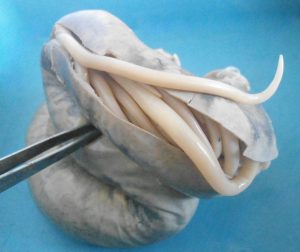 Ascaris lumbricoides is a large roundworm that infects the intestines, causing ascariasis, one of the most common human parasitic infections worldwide. The parasite is transmitted through ingestion of food or water contaminated with its eggs, often in areas with poor sanitation. Infected individuals may experience symptoms such as abdominal pain, malnutrition, and in severe cases, intestinal blockages, especially in children. If left untreated, ascariasis can lead to significant health problems, particularly in young children, where it affects growth and cognitive development.
Ascaris lumbricoides is a large roundworm that infects the intestines, causing ascariasis, one of the most common human parasitic infections worldwide. The parasite is transmitted through ingestion of food or water contaminated with its eggs, often in areas with poor sanitation. Infected individuals may experience symptoms such as abdominal pain, malnutrition, and in severe cases, intestinal blockages, especially in children. If left untreated, ascariasis can lead to significant health problems, particularly in young children, where it affects growth and cognitive development.
Clearing Ascaris lumbricoides from the body through antiparasitic medications like albendazole or mebendazole effectively resolves the infection and prevents complications such as intestinal obstruction. Eradicating the parasite leads to improved digestion and nutrient absorption, especially for children suffering from malnutrition. Implementing sanitation measures like proper sewage disposal, improved hygiene practices, and educating communities about food safety can dramatically reduce the incidence of ascariasis and promote better overall health in affected areas.



